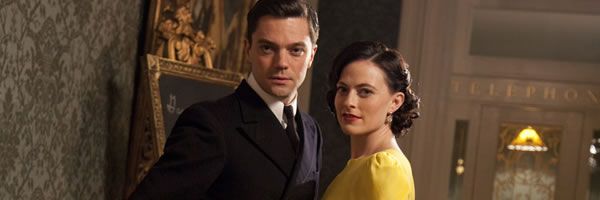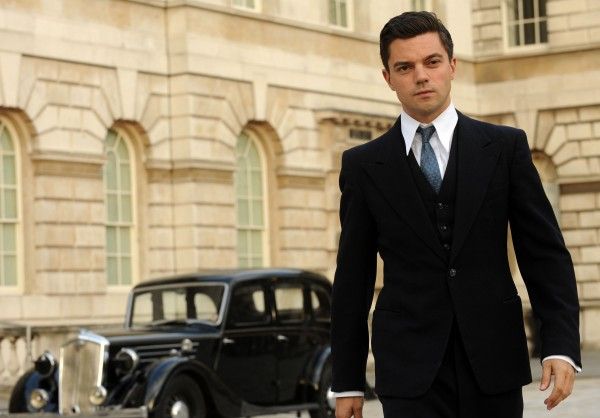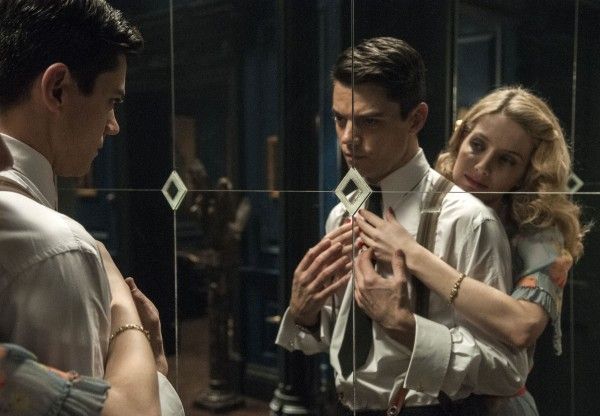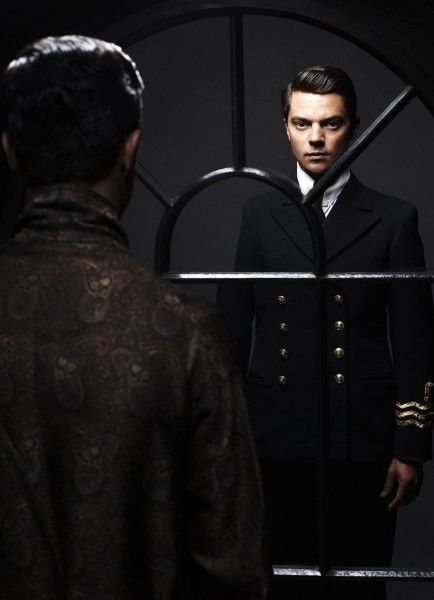Before the thrilling adventures of James Bond hit the page or screen, they were experienced first-hand by author-to-be, Ian Fleming (Dominic Cooper). The four-part original drama Fleming: The Man Who Would Be Bond tells the fascinating story of the man whose own life and escapades were the inspiration for one of the most iconic figures in modern literature.
During the BBC America portion of the TCA Press Tour, director Mat Whitecross and executive producer Douglas Rae talked about how this project came about, how they created the look they wanted, Ian Fleming's weird relationships with women, using the music, and the ongoing popularity of the spy genre. Check out what they had to say after the jump.
Question: How did this project come about?
DOUGLAS RAE: My great claim to fame, growing up in Edinburgh, was that Sean Connery was my mother’s milkman. He was a milkman, but in his nighttime, he was trying to get a job as an actor. He was in South Pacific and A Chorus Line, and then eventually Broccoli chose him to play Bond, which horrified Ian Fleming, at the time. He saw his Bond character like himself – a suave, sophisticated old Ottonian, and Sean Connery was a milkman. Anyway, that’s by-the-by. This project really started because we had an idea of making it as a movie. The script came in and it was four hours long, which was going to be an expensive movie, but the story was so good that we didn’t want to cut anything out. And so, the ambition was to create a series that was as good as a Bond film. Not quite the $150 million budget, but something that really told the story behind Ian, himself. And to anyone who knows the background of Ian, he was such an enigmatic, chameleon kind of character. But for me, the fascination was doing a film about the man who desperately wanted to be somebody else – his alter ego, which was this heroic, all-action hero.
What did you have to do to create the look you wanted for this?
MAT WHITECROSS: It’s always variable. It was a generous budget, but very tight for what we were trying to do. You always try to be more ambitious and push it. It’s tricky. It’s always a balance. We never felt that we had enough time, but that’s not unusual for anything I’ve ever worked on. The amazing thing really was working with Dom [Cooper] and Lara [Pulver]. They would just step up to it. If we had to nail something in one take, and we were doing a Bond-type action sequence where I imagine you do two or three months of rehearsals and probably spend a week or two shooting it, we’d have three hours and we’d just hit the ground running and get what we could get.
Ian Fleming had weird relationships with women, as does James Bond. How did you view that, and do you think he deliberately wrote Bond that way?
WHITECROSS: Yeah. From my perspective, I think what’s fascinating is going back and looking at the novels again. What’s fascinating about Bond and the Bond novels, and then the Bond films is that they didn’t really emulate it at first, but they’re coming around to that way. He’s a very dark, depressive, quite twisted character in Casino Royale, and he’s actually reactive, most of the time. He’s not always an action man. A lot of stuff happens to him or around him. The villain really wins. He’s only saved by another villain in Casino Royale, and that was fascinating to me. And actually, going back and looking at these scripts, what’s fascinating is that you get moments of Fleming’s life that are like Bond’s, but then, he constantly doesn’t come up to scratch. He fails. He tries to be his brother, who is a Bond-like figure, and he fails. There is a connection between him and Bond, but not the one that people would necessarily associate.
RAE: I think Fleming probably used his mother as that archetypal Bond Villain. The lady with the spikes was his mother. Ian’s brother Peter was good at everything. He was good at school, good at university, good in the Army and was a great writer. Ian was like James Dean. He was a rebel in search of a cause.
The music in this movie sounds probably as close as you can get to the classic James Bond theme, legally. Did you guys work out how close you could get with the music, to still make it recognizable?
WHITECROSS: What is amazing about the Barry theme for James Bond is that it’s so malleable. It’s really simple. And you get a flavor of it just with a shift in semitone. It’s so familiar. We knew that we needed to nod to the Bond films, musically, and in terms of the look of it and the manners of speech and the playfulness, without it ever descending into pastiche. One way to do that would be to do a completely modern score, but that just felt like that wasn’t going to give me enough resonance for the playfulness that the script had. On the other hand, you don’t want it just to feel like we’re ripping it off. So, it was a careful balance. The idea was to start each episode with a moment that could be from a lost Bond film that you’ve never seen, and then reality intrudes. Tonally, it was a quite tricky one to get right, and similarly with the music. We went through lots of different themes, and have our own music, as well.
How much flexibility can you have with only four notes?
WHITECROSS: Surprisingly, loads. It’s familiar enough that you can be playful with it and end it in a slightly different way. If you’re got different music underneath it, it is weirdly very flexible.
The spy genre has really gotten a boost lately with so many different projects set in various eras. Why do you think that is?
WHITECROSS: It’s very odd, what it is that makes certain genres work at different times. Fleming wrote the novels, coming out of the Second World War, when it was a time of hysteria in England, and we’re going through a similar thing now. I think people wanted to escape in fantasy. And similarly, with the Bond films that are coming up, it’s just fun seeing spies go around. It’s never gone out of fashion.
Fleming: The Man Who Would Be Bond premieres on BBC America on January 29th.




